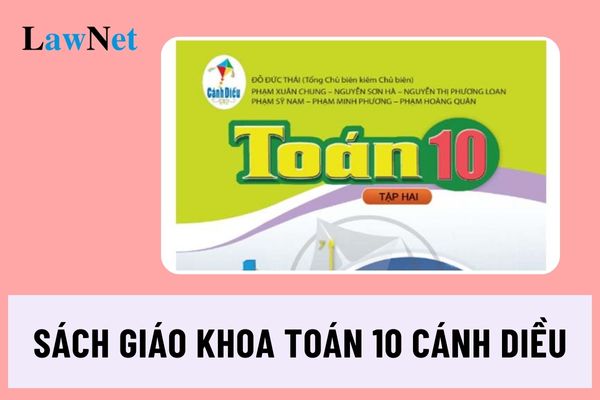What is the textbook used for "Canh Dieu" Maths program for grade 10 in 2024–2025 school year in Vietnam?
What is the textbook used for "Canh Dieu" Maths program for grade 10 in 2024–2025 school year in Vietnam?
According to the List of Grade 10 Textbooks used in general education institutions issued along with Decision 442/QD-BGDDT 2022, the textbook used for "Canh Dieu" Maths program for grade 10 in 2024–2025 school year include:
| BOOK TITLE | AUTHOR | PUBLISHER |
| Math 10, Volume One (Canh Dieu) | Do Duc Thai (Chief Editor and Editor-in-Chief), Pham Xuan Chung, Nguyen Son Ha, Nguyen Thi Phuong Loan, Pham Sy Nam, Pham Minh Phuong, Pham Hoang Quan | |
| Math 10, Volume Two (Canh Dieu) | Do Duc Thai (Chief Editor and Editor-in-Chief), Pham Xuan Chung, Nguyen Son Ha, Nguyen Thi Phuong Loan, Pham Sy Nam, Pham Minh Phuong, Pham Hoang Quan | University of Education |
| Specialized Study Topics in Math 10 (Canh Dieu) |
Do Duc Thai (Chief Editor and Editor-in-Chief), Pham Xuan Chung, Nguyen Son Ha, Nguyen Thi Phuong Loan, Pham Sy Nam, Pham Minh Phuong, Pham Hoang Quan |

What is the textbook used for "Canh Dieu" Maths program for grade 10 in 2024–2025 school year in Vietnam? (Internet image)
What are the content requirements for the textbook used for "Canh Dieu" Maths program for grade 10 in Vietnam?
Based on Article 5 of the Regulations on the standards, process of compiling, and editing textbooks; standards of organizations and individuals involved in compiling textbooks; organization and operation of the National Council for Textbook Appraisal issued along with Circular 33/2017/TT-BGDDT, the content of the Math 10 Canh Dieu Textbooks must meet the following conditions:
- The content of the textbooks must correctly and fully reflect the subject or educational activity's curriculum; ensure basic, scientific, practical, and appropriate content for the realities in Vietnam.
- Terms, concepts, definitions, data, events, and images must be accurate, objective, consistent, and appropriate to the students' level; data, events, and images must have clear origins.
- New scientific achievements related to the subject or educational activities must be updated, meeting international integration requirements and suitable to the subject curriculum's objectives.
- Educational content on national sovereignty, human rights, children's rights, gender equality, sustainable development, environmental protection, and adaptation to climate change must be reasonably represented.
How are the new math education programs' assessment methods implemented in Vietnam?
Based on Section 7 of the Math Education Program issued along with Circular 32/2018/TT-BGDĐT, new methods for assessing math education programs are as follows:
Applying a combination of various assessment forms (process assessment, periodic assessment), multiple assessment methods (observation, recording the execution process, oral examination, objective tests, written exams, practical exercises, learning projects/products, performing practical tasks, etc.) at appropriate times.
Process assessments (or continuous assessments) are organized by the subject teacher, combined with evaluations from teachers of other subjects, self-assessments by the evaluated student, or evaluations from other students in the group/class or parents. Process assessment is aligned with the student's learning activities, avoiding separation between teaching and assessment, ensuring the goal of assessment for students’ progress in learning.
Periodic assessments (or final assessments) mainly aim to evaluate the achievement of learning objectives. Results from periodic and final assessments are used to certify learning levels and recognize students' achievements. Periodic assessments are organized by education institutions or included in national examination and assessment schedules.
Periodic assessments also aim to manage teaching quality assurance activities at the institution and support the development of the Math curriculum.
Students’ abilities are evaluated through evidence of results achieved during their task execution.
The assessment process includes basic steps such as determining the purpose of assessment; identifying necessary evidence; selecting suitable methods and tools; collecting evidence; interpreting evidence, and providing feedback.
Focus on selecting methods and assessment tools for elements of mathematical ability. Specifically:
- Assessing the ability to think and reason mathematically: using questions (oral, written), exercises, etc., requiring students to present, compare, analyze, aggregate, and systematize knowledge; applying mathematical knowledge to explain and reason.
- Assessing the ability to model mathematically: choosing situations in reality that lead to mathematical problems.
This requires students to identify a mathematical model (including formulas, equations, tables, graphs, etc.) for the given real-world situation; solving mathematical problems within the established model; presenting and evaluating the solution in the real-world context and improving the model if the resolution is not appropriate.
- Assessing problem-solving abilities in mathematics: methods might include requiring students to identify situations, detect, and present problems to be solved; describe and explain initial information, goals, and desired outcomes from the considered problem; collect, select, arrange information, and connect with prior knowledge; use questions (requiring written or oral answers) that need application of knowledge to solve problems, especially practical problems.
Simultaneously, use observation methods (such as checklists according to predetermined criteria), observe students during problem-solving; evaluate through students' practical products (such as learning project outputs); reasonably address integrative assessment tasks.
- Assessing the ability to communicate mathematically: methods such as asking students to listen, read, note (summarize), analyze, choose, extract basic and significant mathematical information from spoken or written texts; use mathematical language combined with ordinary language to present, express, ask questions, discuss, argue mathematical content, ideas, solutions in interaction with others.
- Assessing the use of tools and means for studying mathematics: methods such as asking students to recognize names, functions, usage norms, usage methods, advantages, and limitations of mathematical tools and means; presenting the (appropriate) use of mathematical tools and implements to undertake learning tasks or express mathematical reasoning and proofs.
When teachers plan lessons, criteria, and assessment methodologies must be set to ensure that by the end of each lesson, students achieve basic requirements based on these criteria before proceeding to subsequent learning activities.
>> More details about the Math Education Program can be founde in Circular 32/2018/TT-BGDĐT:

